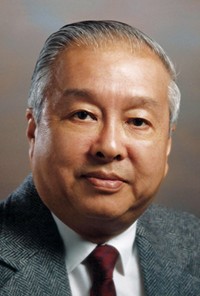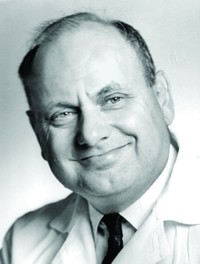Advertisement
Grab your lab coat. Let's get started
Welcome!
Welcome!
Create an account below to get 6 C&EN articles per month, receive newsletters and more - all free.
It seems this is your first time logging in online. Please enter the following information to continue.
As an ACS member you automatically get access to this site. All we need is few more details to create your reading experience.
Not you? Sign in with a different account.
Not you? Sign in with a different account.
ERROR 1
ERROR 1
ERROR 2
ERROR 2
ERROR 2
ERROR 2
ERROR 2
Password and Confirm password must match.
If you have an ACS member number, please enter it here so we can link this account to your membership. (optional)
ERROR 2
ACS values your privacy. By submitting your information, you are gaining access to C&EN and subscribing to our weekly newsletter. We use the information you provide to make your reading experience better, and we will never sell your data to third party members.
People
Obituaries
by Rachel Petkewich
February 12, 2007
| A version of this story appeared in
Volume 85, Issue 7
Paul Becher, 88, a colloid chemist and former associate director of chemical research at ICI Americas, died on Jan. 3.
He was born in New York City and received a B.S. in 1940 and an M.S. in 1942 from Polytechnic Institute of Brooklyn. After service in World War II, he returned to Brooklyn Polytech and completed his Ph.D. in 1948.
Becher spent a few years on the faculty at North Georgia College in Dahlonega, Ga., before joining Colgate-Palmolive in 1951. There, he wrote the first edition of his classic book, "Emulsions: Theory and Practice."
In 1957, he joined Atlas Powder Co. (which later became a part of ICI Americas) as a research associate in surface chemistry. He became manager of the physical chemistry section in 1970, director of specialty chemicals research in 1975, and associate director of corporate research in 1979. He retired from ICI in 1981 to pursue a career as a consultant, author, and editor.
An emeritus member of ACS, Becher joined the society in 1941. He was active in ACS and chaired the Division of Colloid & Surface Chemistry in 1974, the Colloid Symposium Committee from 1967 to 1969, and the Delaware Section in 1978.
Becher's wife died in 2005. He is survived by two children.
Richard L. Beveridge, 71, a retired NMR scientist, died suddenly on Aug. 27, 2006.
Born in Brooklyn, N.Y., he received a B.S. degree in chemistry from West Virginia Wesleyan College in 1959. He held several jobs before retiring from Novartis Pharmaceuticals in 2002.
His family noted that he was always a gentleman; that he had a wry sense of humor; and that he enjoyed skiing, gardening, home repair, and walking his dogs.
Beveridge is survived by his wife of 40 years, Bridget; a sister; a niece; and a nephew. An emeritus member, Beveridge joined ACS in 1962.
Charles M. Blair, 96, a retired petroleum chemist, died on Dec. 26, 2006, after a brief illness.
A native of Vernon, Texas, Blair earned a B.S. degree in 1931 and an M.A. degree in 1932 from Rice University. He received a Ph.D. in chemistry and mathematics from California Institute of Technology in 1935.
Blair then joined Petrolite Corp. in St. Louis as a chemist and later was named director of research. In 1950, he was elected company president.
In 1944, Blair synthesized and patented the chemical compound that made the low-cost and high-volume preparation of penicillin possible. He was best known, however, for inventions of products and processes used in the production and refining of petroleum.
In 1964, he moved to Magna Corp., now a division of Baker Hughes, where he served as division president until his retirement in 1988. He held 125 U.S. patents and was author of 45 scientific publications and numerous articles on cultural and economic subjects.
Blair is survived by two children, five grandchildren, and five great-grandchildren. An emeritus member, he joined ACS in 1937.
Robert R. Buck, 86, who spent his 40-year career as a chemist at Merck, died on Oct. 27, 2006.
Born in Carroll County, in Indiana, he received a B.S. in chemistry from Indiana University in 1942. He served from 1942 to 1946 as a U.S. Army officer in World War II.
An emeritus member, Buck joined ACS in 1945. He became a chemist with Merck in Rahway, N.J., in 1946 and retired as assistant director for regulatory affairs in 1986.
His first wife, Lucille Buck, died in 1982, and his second wife, Gertrude Friese, died in 2005. He is survived by two children and a grandson.
Kent S. Dennis, 78, a retired senior research associate in Central Research at Dow, died on Jan. 1.
He earned his B.S. degree in chemistry from Grove City College, in Pennsylvania. He received his master's and Ph.D. degrees from what is now Case Western Reserve University, Cleveland.
In 1954, he started working at Dow. He was drafted into the U.S. Army for two years but returned to Dow, retiring in 1986.
Dennis was a devoted member of his church, and as organist, he played at weekly services and for more than 700 weddings. He built a pipe organ in his basement so he could practice and teach students how to play.
Dennis is survived by his friends and colleagues, who characterize him as generous, kind, and gentle. He joined ACS in 1958.
Irving Sunshine, 90, a pioneering toxicologist, died of multiple myeloma on June 14, 2006.
He was born in New York City. During World War II, he worked the graveyard shift at the Manhattan Project's pilot plant for separation of uranium isotopes by gaseous diffusion. He received all of his degrees from New York University: B.S. in 1937, M.A. in 1941, and Ph.D. in chemistry in 1950.
Until his retirement in 1985, Sunshine was the chief toxicologist at the Cuyahoga County Coroner's Office in Cleveland; professor of toxicology and clinical pharmacology at Case Western Reserve's School of Medicine; and toxicologist of the University Hospitals of Cleveland. According to his family, at the time of his death, he was emeritus chief toxicologist, emeritus professor, still professionally active, and a much sought after toxicology consultant.
Sunshine mentored many students and helped transform toxicological analysis from early wet chemistry methods to sophisticated, modern techniques, such as spectrophotometry and gas chromatography/mass spectrometry.
Sunshine's additional efforts led to the establishment of the Cleveland Poison Prevention Center, which he directed for 24 years. He was president of the American Association of Poison Control Centers from 1966 to 1968 and chaired its Education Committee from 1964 to 1979.
He garnered many awards himself, and three separate toxicology and forensic organizations established awards of distinction called the Irving Sunshine Award. He wrote about 20 books and served on several editorial advisory boards.
Sunshine was a seasoned international traveler, an enthusiastic patron of the arts, and an avid gardener. He was also devoted to the Yiddish language, working to preserve it in various programs.
Sunshine was married to Helen Sunshine until her death in 1983, and then to June Singer until her death in 2004. He is survived by two sons, a brother, five grandchildren, and three great-grandchildren. An emeritus member, he joined ACS in 1943.
Obituaries are written by Rachel Petkewich. Obituary notices may be sent to r_petkewich@acs.org and should include detailed educational and professional history.







Join the conversation
Contact the reporter
Submit a Letter to the Editor for publication
Engage with us on Twitter